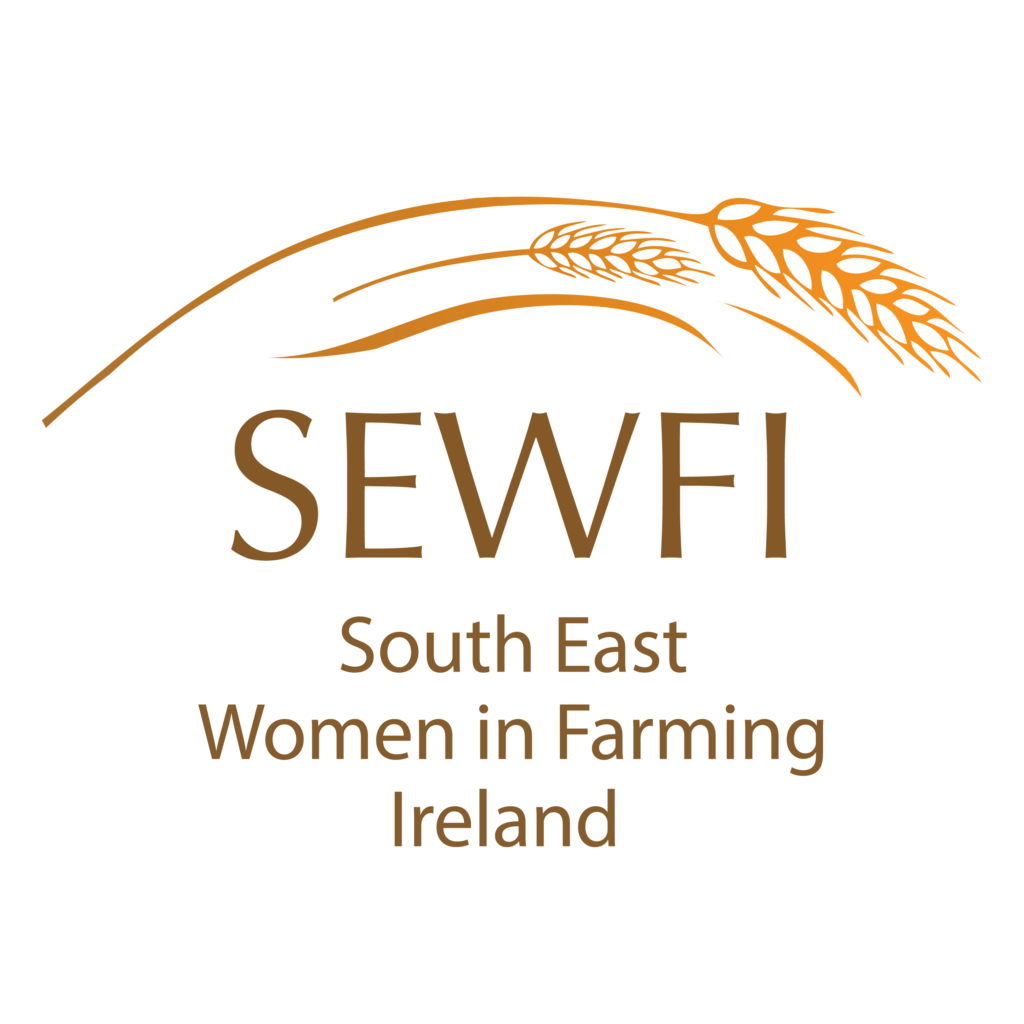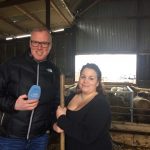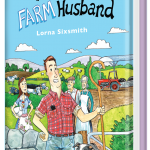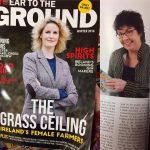
Why do you need a women in farming group?
Can’t you join the IFA?
What about the I.C.A?
How about a “people in farming” group? Isn’t having two (IFA and a women in farming) more divisive?
It’s coming up to a year now since five us us got together to set up South East Women in Farming and put out word on social media and by word of mouth inviting women to come along. We had about 40 women at that first meeting, all with ideas regarding what they saw as important. These ranged from health and safety issues to childcare and maternity rights to education about farming practices. It became clear that networking with other farm women was seen as important too. We established aims to encourage the sharing of knowledge, the raising of self esteem and confidence, and networking.
 There are now four groups set up in the country, South East, Munster, West and North West. They aren’t lobby groups. To date, the SEWFI (South East group, pronounced Sophie) meetings have included a panel of journalists exploring why farm women aren’t represented in agricultural media as much as we female farmers think fitting; an exploration of farm-related courses; two female farmers talking about their paths into farming and the challenges faced; health and safety; mental health and a trip to Wales (I’ve described the trip to Wales in this post). I’m probably speaking from a biased opinion being one of the organisers but I think there’s a friendly and fun vibe at the meetings. For example, George Graham and Margaret Hoctor spoke at our meeting on mental health. George spoke frankly about his own experiences and you could have heard a pin drop. Margaret’s talk was perfect after the break for tea – she used self-deprecating humour to describe her own experiences after her role became redundant and the challenges she faced in re-inventing herself. Fun as well as inspiring.
There are now four groups set up in the country, South East, Munster, West and North West. They aren’t lobby groups. To date, the SEWFI (South East group, pronounced Sophie) meetings have included a panel of journalists exploring why farm women aren’t represented in agricultural media as much as we female farmers think fitting; an exploration of farm-related courses; two female farmers talking about their paths into farming and the challenges faced; health and safety; mental health and a trip to Wales (I’ve described the trip to Wales in this post). I’m probably speaking from a biased opinion being one of the organisers but I think there’s a friendly and fun vibe at the meetings. For example, George Graham and Margaret Hoctor spoke at our meeting on mental health. George spoke frankly about his own experiences and you could have heard a pin drop. Margaret’s talk was perfect after the break for tea – she used self-deprecating humour to describe her own experiences after her role became redundant and the challenges she faced in re-inventing herself. Fun as well as inspiring.
Why do we need a “woman in farming” group? Bear in mind that these reasons are from my own perspective. This is my blog after all 🙂
More Recognition that Women Farm is Required
Lots of women work on farms, a quarter of the agricultural workforce is female, and thousands of women keep farms going by supporting the farm financially with an off-farm job. However, only 12.4% of farms are owned by women. One thing that has to change is the fact that while a farm can be jointly owned, it seems to be just one name as the herdowner. Let me share a personal example.
Let me share a personal example. Our farm was in my name, I was the herdowner. I felt a bit guilty as Brian is farming here too. I thought this would be addressed when we were transferring to a company last year. We’re both directors of the company, the herdowner would be Garrendenny Farm. But they wanted one name as herd-keeper. We decided to put Brian’s name down as he has just the farm to concentrate on whereas I’ve different things on depending on the season. When it came to the “Top 200 EBI herds” list, Garrendenny Farm wasn’t listed. Brian James was. I’ve disappeared. It’s ridiculous. Lack of space is no excuse as they were able to fit my full name “Lorna Sixsmith-James” on there previously. When papers reported on a decrease in a number of farms owned by women, well, I was one of them. I thought the move to the company was a positive one in terms of equal recognition as we’re both directors but that doesn’t seem to matter.
There needs to be a change in policy. While the Dept of Agri might need one person named as the person to contact regarding a query, both partners should be listed as herdowners if they wish to do so. Surely with the increase in legal partnerships of parents and adult children or neighbouring farmers, this scenario has to apply to them too.
Lack of Female Representation within Farming Groups
The number of women in the Irish Farmers Association is negligible. There are 50 executives and only one is female – and some would argue her role is a “female-orientated” role being based on Family Farming. When I asked the three Presidential hopefuls a couple of years ago what they would do to improve the ratio of women within the IFA, there seemed to be a consensus that because of practical reasons (childcare, babysitting etc) it was men who tended to go to the meetings. But I feel if women wanted to be in the IFA, they would make the effort to attend meetings. For whatever reason, and I suspect there are many, they don’t seem to feel the IFA is for them.
The IFA did publish a submission to a new Women’s Strategy on International Women’s Day. Those more cynical than me might say it was a publicity stunt as very little seems to have happened since but we’ll wait and see. The women in farming groups are not operating in opposition to the IFA. According to their submission, we have many of the same goals but the IFA has a lot more going on besides.
Maybe being active in the women in farming groups will encourage more women to consider taking up roles within the IFA. Maybe the IFA will see their way to appointing more women as executives. Time will tell.
Global Movement for Women in Farming groups
Other countries are also forming “women in farming” groups. We’re not following their lead as such but there seems to be a general momentum and recognition that this movement is needed. When we were at the Royal Welsh Show, we met up with the Welsh Farming Connect Women in Agriculture. There’s a Women in Dairy group in the UK and they host a conference annually. There is a recognition there that women are actively farming that conferences for women as farmers are required and is proving to be a good move. There’s a “Ladies in Beef” Twitter account and they work with supermarkets and other businesses to promote beef to consumers. There are lots of groups in NZ, Australia, US and Canada. There’s an AgWomen Global initiative too.
The hashtag #womeninag is a popular one. Yes, I agree, it would be great if we didn’t have to have such hashtags (after all, there’s no #meninag tag), or if we didn’t have to use the term “female farmer” but the general image of a farmer is still a male one. During WW1, the term “women gardeners” was used as it wasn’t seen as a typically female occupation. Yes, I know we’re in 2017 but sometimes you wouldn’t know it. How long will it take for “farmer” to be non-gender specific? A generation? A decade? Half a century? Yet again, time will tell.
LEO Women in Business has proved successful
Much research followed by government investment resulted in the formation of many Women in Business groups by county LEOs. It was recognised that women needed mentors, networking, confidence-building within women-only groups to increase their chances of success. Yes, the Women in Business groups got some flak for being female only but many still exist so they must be working. Let’s remember farm women are business women too. While men are very welcome to attend our meetings, there’s a reason why they haven’t been set up as “people in farming”. The focus is on improving the lot of women in farming.
Action for Change
A piece of RTE footage from 1977 reveals two farm women who will do anything on the farm bar go to the mart. Another woman, who did go to the mart, said that she felt things were changing and many more women would be attending marts soon. That was 40 years ago. There are still very few women at marts. We must learn from history and we can’t just presume that things will change.
In 2013, I attended a meeting at the Horse and Jockey. They invited about 50 women to discuss the findings by Lily Mulhall in her research on women in farming. We were all fired up leaving, confident that something was going to happen. We’d asked to be kept informed and to be able to stay in contact with each other. After a few months, we received an email saying that due to data protection, our email addresses couldn’t be shared. That was the end of that or so it seemed. Then I received a phone call from Ann Stenning from Wexford, a woman who is determined for change. She also made contact with women in a Kerry group. I met up with all of them and we got other women involved. We’ve learnt from the past. It’s not enough to presume things are changing. We have to make change. We owe it to our daughters and grand daughters.
Succession
Three people have asked Brian in the last fortnight if Will is going to farm. When he said “I doubt it”, not one asked if Kate would. Her existence wasn’t even considered. The response was more like “what are youse killing yourselves for?” and that reply brings up other issues – yes, another blog post sometime.
The results of a survey about succession undertaken by the IFA and Macra in 2013 reveal that in response to two questions, 8.6% and 10.6% of the mostly males surveyed (Survey was of IFA members hence no surprise that 95% were male) replied that they “only had daughters” which was the reason for no farming successor. Although the report included various recommendations for improving the rate of farmers with identified successors, and it did recognise that there was a “low level of anticipated transfer to daughters”, it simply concluded that this “may also reflect the reality that parents are concerned about the suitability of farming as a career for their daughters (especially due to the physical nature of the work)”. Hmmm, someone needed to remind them that for decades it was men propping up the barriers at the mart while women were milking cows and feeding calves. There was no suggestion in the recommendations that this thinking should be encouraged to change. That was published in 2013, a mere four years ago.
Should my daughter decide to farm, I really don’t want to hear her saying to me in twenty years time that she’s having to listen to the same old sh1te. I want things to change for her generation. Daughters and sons should be equally eligible to inherit a farm.
Representation of Female Farmers in the Media
This is something that has improved immensely in the last six months. Is it a coincidence or is it because of the formation of the women in farming groups? I’ll let you decide. The “farming week” slots were usually about male farmers. If a farming family were profiled, it was usually the man’s name throughout and perhaps the female was mentioned as “the wife” in the last paragraph. It drove me mad especially as I could see much more equality in the UK and NZ farming media in particular. In the last six months however, there have been many more women profiled in “My farming week” type features. Farming couples are described as “Mary and John XXX” in the first paragraph. (I haven’t done a statistical analysis but there’s a definite move to recognise both partners in the family farm relationship). The Farmers Journal, following the huge dairy event at Moorepark, had a photo on their front page which showed four women walking toward the camera, slightly ahead of the main group. The caption contained words something like “leading the field”. Was that coincidence? I think not. I do want to acknowledge that journalists are working to address the difference and to thank them for their efforts. By showcasing women as active farmers, it will infiltrate people’s brains and change thinking regarding women as successors to farms.
Plenty of Room for other Women Groups
Our groups aren’t a threat to the ICA or any similar groups. I’ve a lot of respect for the ICA and joined for a year. It has existed for over a century and it did so much for women, particularly in the 1960s and 70s with their campaigns for piped water and electricity in rural homes. They also did so much to help women in setting up rural businesses be it B&Bs, or selling produce or crafts. It’s a great group if you want to learn how to make crafts or even butter-making – perhaps not so good if you want to learn how to stomach tube a calf though. And yes, SEWFI is planning a day trip to Moorepark in November with a focus on calf rearing.
To conclude then, I don’t see the IFA or many of the other farm groups as empowering women. That is what the women in farming groups want to address. What’s happening in the immediate future? The NW group is organising a trip to Brussels for 8 women. Suzanna Crampton is speaking at the SEWFI event on Tuesday night (Dolmen Hotel in Carlow at 7:30 pm if you’d like to come along) showing how social media has helped her to treble the income from her sheep on 14 acres. The SEWFI group is planning a “calf rearing training” day to Moorepark.
How long will the women in farming groups last? Who knows? But hopefully they will exist for as long as they are needed. Once equality in farming is achieved, and I hope it is soon, they may cease to exist and that’s okay.











Matt Care
This is fascinating stuff. I saw a recent stat that had only 27% of farmers knowing who their succession was going to be. It had not even occurred to be about the issue you describe near the end of the 1st book, that the arrival of Divorce in Ireland has thrown a cat among the succession pigeons. That the keeping the farm “in the family” means, really “in the MALE line” so if a woman marries into it and then gets divorced and “takes” half , that is seen as the farm being taken out of the family. It is not just in-the-family-but-under-the-new-name Was a bit of a shocker when I digested that one. I am, in general pro-Divorce and pro-choice. Pro equality, certainly. Food for thought, indeed. Thanks for that. A good post.
Lorna Post author
Thanks Matt, I was listening to a radio show a while back where they were discussing the need for pre-nups as we’re all living so much longer now, should we really be expected to spend perhaps 50+ years with the same person? Huge impact on farm families if there’s a divorce – interestingly it’s often the parents in their 60s who are getting divorced not the son with his “young wan”.
Matt Care
Ha ha. The OH, who is quite strongly pro-Equality, Repeal the 8th and very angry about the RC child-abuse cover ups and Tuam child-burials etc is currently applying for a job where she will be admin-ing for the Local Priest. We were joking around whether she’ll have to ‘adjust’ the FB persona a bit! 🙂 What me? Pro choice? No no – you must be thinking of someone else with the same name!
Lorna Post author
Could be interesting by the sounds of it alright